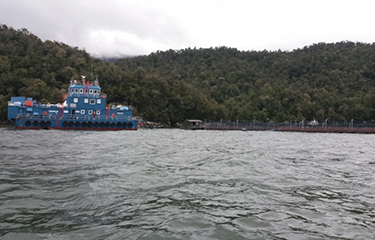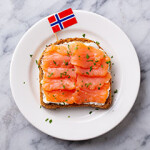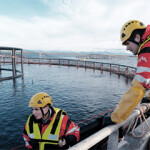Cooke may pursue international arbitration in salmon-farming dispute with Chilean government

The Chilean branch of Cooke Aquaculture is claiming it is being discriminated against by Chile’s Superintendency of the Environment (SMA), which the company says is affecting its operations in the country and for which it may seek international arbitration.
The impasse could potentially throw a wrench into the works for Chile’s USD 6 billion (EUR 5.5 billion) salmon-farming industry and harm the country’s reputation for having an investment-friendly regulatory agenda.
SMA is seeking sanctions against Cooke Chile for alleged overproduction at some of its salmon farms located in a national park. Cooke has denied the allegation and called the ruling arbitrary.
SMA’s order to significantly reduce production at the farms is “simply unthinkable from an economic standpoint and would lead to the need to close those centers, besides constituting a regulatory expropriation, prosecutable before ICSID [the World Bank’s International Center for the Settlement of International Disputes], given the international treaty that protects Cooke's investment,” Cooke Aquaculture Chile General Manager Andrés Parodi said in a letter to Chile Environment Minister María Heloisa Rojas. The letter was made public through a lawsuit Cooke filed with the Third Environmental Court asking for relief from the SMA’s mandates.
Cooke Aquaculture entered Chile in 2008 when it purchased Salmones Cupquelán for USD 106 million (EUR 98 million). Its decision to enter this market was driven by “the stability of the regulation and the seriousness of the decisions made by the Chilean authorities,” Parodi said. It currently employes more than 600 people in Chile and accounted for 3.47 percent of the total amount of salmon produced in Chile in 2021.
Cooke Chile had “constantly sought to promote dialogue with the national authority to avoid having to turn to international instances of conflict resolution to denounce the grave situation of which we are victim and which would cost the state of Chile several hundred million dollars, creating a completely unnecessary contingency,” Parodi said, adding if the same SMA criteria were to be applied to the other farming centers Cooke operates in the country, “18 of our 21 centers would have to close,” along with 27 percent of all the salmon-farming concessions nationwide. The company questioned why it had been singled out, considering that with less than 3.5 percent of Chile’s salmon production, it is one of the smaller salmon farmers in the country.
The dispute arose in 2021 when SMA initiated sanctions against Cooke Aquaculture for an alleged nine breaches of national environmental rules governing salmon farming related to three of its farming centers: Huillines 2, Huillines 3 and Punta Garrao, located in the Cupquelán estuary in southern Chile’s Aysén region. According to the SMA, audits performed on production cycles from 2012, 2014, 2016, and 2020 determined that Cooke had gone over its permitted limit of production by up to 6,500 metric tons (MT) per cycle.
In the case of the Huillines 3 salmon grow-out center, Chile’s Undersecretary of Fisheries and Aquaculture (Subpesca) said Cooke was authorized to stock 617,756 fish. However, in 2022, SMA ordered a halt to stocking 170,000 smolt at the farm as it would result in 2,000 MT of overproduction at the site. SMA said the stocking would have caused potential environmental damage due to the fact that the center, which it says is located within the Laguna San Rafael National Park, had not undergone a formal environmental evaluation.
The center began operating before the national introduction of SMA’s Environmental Evaluation System (SEIA, according to the acronym in Spanish), and so it is regulated through its aquaculture concession and related technical project. But this does not mean the farm does not need to abide by environmental rules, according to the SMA Acting Director Emanuel Ibarra.
“Although the owner can carry out activities that began prior to the entry into force of the SEIA without having an Environmental Qualification Resolution, if they decide to modify the project, it must be submitted to a mandatory environmental evaluation if said modification constitutes a project … that is likely to cause environmental impacts, which is obviously the case here,” he said.
SMA said organic and inorganic waste from salmon farms can cause deterioration of the local marine environment in different ways, including both in the water column and on the seabed, and salmon overproduction can create an environmental burden that leads to a higher level of environmental impact and risk of anaerobic processes. In the case of salmon farms located inside national parks, such effluent may affect the aquatic flora and fauna of an area that should enjoy state protection, such as the case of Laguna San Rafael, SMA said.
According to SMA, the Huillines 3 center’s technical approval allowed for stocking of 50,000 fish and a production of 250 MT. But Cooke Aquaculture Chile interpreted the figures as an established minimum, and said the extra 170,000 smolt would represent additional permitted production of 650 MT.
Cooke Aquaculture maintains the production of salmon has always been authorized by Subpesca and Huillines 3 has met every requisite established by Chile’s aquaculture environmental regulations, the company’s lawyer David Cademártori said in the suit presented to the Third Environmental Court. Further, Chile’s National Fisheries and Aquaculture Service (Sernapesca) previously determined that Huillines 3 did not present a risk of having undue environmental impact. As such, “the precautionary measure is based on false considerations of fact,” Cademártori said.
Additionally, Cooke has argued maritime territory is not considered part of the Laguna San Rafael National Park, and the Cupquelán estuary, where Cooke’s grow-out centers are located, has been determined to be zoned as appropriate for aquaculture, Cademártori said.
The dispute has revealed a disconnect between Chile’s various regulatory authorities, according to Parodi.
“The grave acts committed by the SMA show serious violations of the principles of efficiency, effectiveness, and administrative coordination applicable to all bodies of state administration,” he said. “The SMA intends to sanction an economic activity that has been carried out for more than a decade and that has always been considered in strict adherence to the law by the competent sectoral authorities – Subpesca and Sernapesca – which demonstrates the absolute lack of coordination of the SMA with said authorities.”
Parodi said Cooke’s solid track record in its Chilean operations, including operating under standards set by the Aquaculture Stewardship Council, GlobalG.A.P., Best Aquaculture Practices, BRC, Naturland, Euro Leaf, and Sedex Members Ethical Trade Audit (SMETA) certifications, was further evidence of its desire to conform to environmental best practices.
“There is evident prejudice that seriously violates elementary rights and principles that should guide the instruction of all proceedings, such as the right to defense and the principles of innocence and objectivity,” Parodi said.
Cooke has estimated if it is not permitted to proceed at Huillines 3, it will incur a loss of nearly USD 8 million (EUR 7.4 million): USD 6.2 million (EUR 5.7 million) in lost sales from future harvest of the 170,000 smolt; USD 847,000 (EUR 782,000) in costs of the pens and grow-out centers that cannot be used; and USD 700,000 (EUR 647,000) in having to eliminate the salmon.
The company has signaled that it is open to the possibility of transferring operations to another area with “less environmental conflict.”
Photo courtesy of SMA






Share